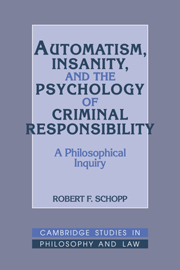7 - Moral foundations
Published online by Cambridge University Press: 07 October 2009
Summary
The first six chapters advance an interpretation of the provisions in the MPC system of offenses and defenses that directly address the psychological states and processes of the defendant. On this account, the MPC voluntary act and culpability requirements limit criminal liability to acts performed in such a way as to allow attribution of the offense to the actor as a practical reasoner. This analysis provides a consistent interpretation of the voluntary act and culpability requirements and of the relationship between the two. These chapters also interpret the automatism and NGRI defenses in a manner that integrates these defenses into the larger system with the structure of offense elements at its core. This analysis enables one to understand the automatism defense as a failure-of-proof defense addressing the voluntary act requirement, and the NGRI defense as a sui generic specific excuse that applies to defendants whose psychological dysfunction prevents them from performing their offenses as competent practical reasoners.
A satisfactory system of criminal offenses and defenses should be not only conceptually consistent but also morally defensible. Chapter 7 argues that the analysis advanced in the first six chapters provides a morally defensible account of the significance of the defendant's psychological states and processes for criminal liability. This chapter does not attempt to construct or defend a complete theory of moral responsibility. Rather, it contends only that the system of offenses and defenses presented in the first six chapters is consistent with common intuitions regarding the necessary conditions of moral and legal accountability.
- Type
- Chapter
- Information
- Automatism, Insanity, and the Psychology of Criminal ResponsibilityA Philosophical Inquiry, pp. 218 - 262Publisher: Cambridge University PressPrint publication year: 1991

